

Because Zapier hosts thousands of people at our annual virtual conference, ZapConnect, our team is very familiar with what it's like to put on a big, complex event. It takes months of planning, dedicated marketing campaigns, and a nearly superhuman ability to make sure the day itself goes off without a hitch. Especially when you're accommodating a mix of in-person and virtual guests, event planners need to keep a million plates spinning at once.
Put event registration and promotion on autopilotThe right event management software can make the process less of a headache by letting you run every aspect of your event in one place. The best tools also directly improve the attendee experience, with mobile apps, networking functionality, and dynamic virtual environments.
After taking a few weeks to research the top-rated tools on the market and speaking to professionals who actually use these apps, I've narrowed it down to the eight best apps in the event management space.
Event management apps come in all shapes and sizes—and promise all sorts of successes. Here, I'm showcasing apps that save you time and energy when managing logistics, deadlines, and attendee engagement. The event management apps listed here are full-service apps that let users host a mix of event types, including in-person, virtual, and hybrid.
Your mileage may vary when it comes to the specific features and use cases you're looking for, but most event marketers have a few priorities in common. The best event management tools simplify the process of organizing a great event while creating a streamlined, memorable experience for attendees. When researching apps for this list, I decided to include only ones that meet the following basic criteria for a well-rounded event management tool:
To find the best of the best, I spoke to event managers, watched demos, and spent more time on Reddit than was probably healthy. Based on all those inputs, I narrowed it down to the eight best event management platforms.
Best for
Standout features
Pricing
Ease of use and flexibility
Fully customizable registration forms with unlimited conditional logic and registrant types
Paid plans start at $11,800/year
Advanced email marketing features
Drag-and-drop email builder with multimedia content support, advanced segmentation, and analytics
Modular platform allowing users to choose and scale features as needed
Optimizing attendee experiences
Mobile app features for networking, engagement tools like Q&A and polling, and customizable event websites
Community and learning management
Integrated LMS for offering courses and certifications, multi-language support, and dynamic virtual environments
Best-in-class customer support, advanced registration workflows, automated check-in, and dynamic widgets
Paid plans starting at $5,000 for one event
Enterprise security and compliance
Robust security and compliance features, personalized attendee experiences, and CRM integrations
Visualizing event spaces
Advanced seating planner, self-serve sponsor portal, and streamlined organizer dashboard
Paid plans start at $2,950 for one event
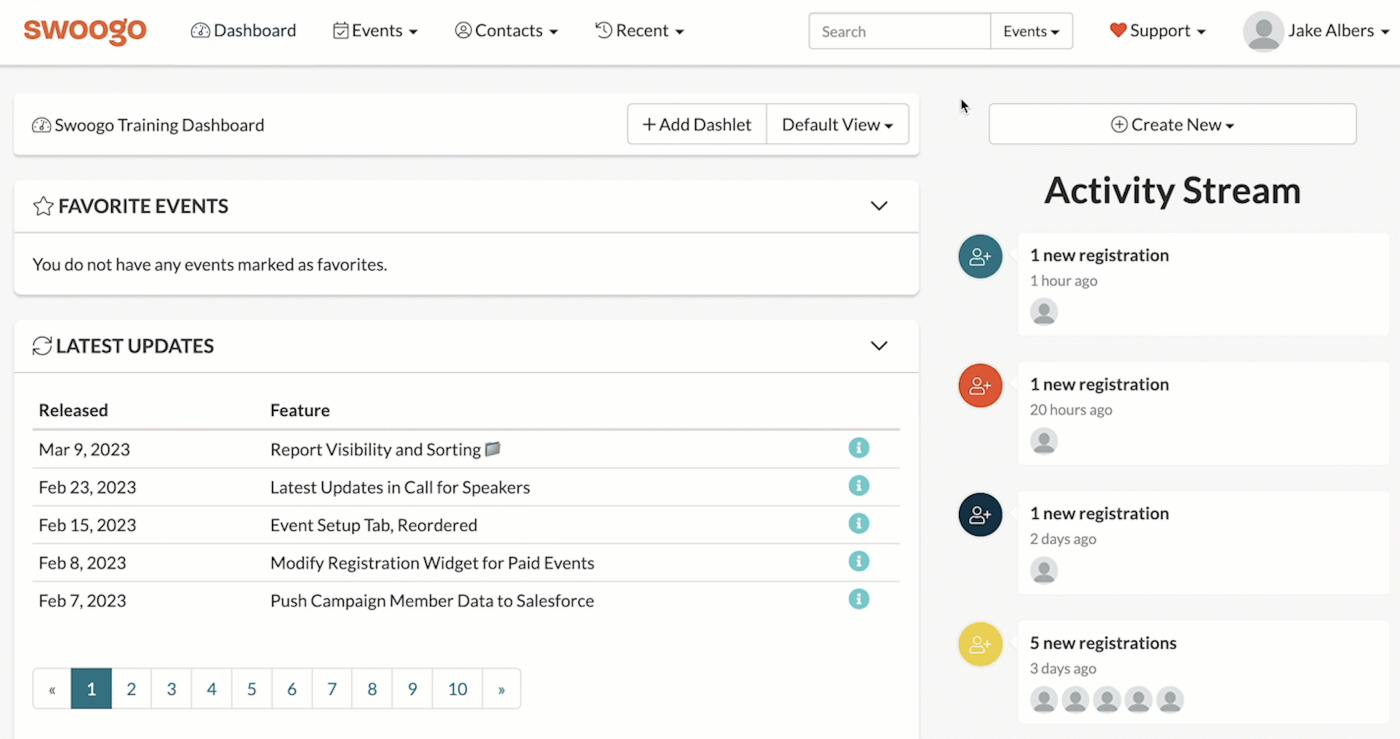
Swoogo pros:
Swoogo cons:
Swoogo is known for its user-friendliness and flexibility, but the ease of use doesn't come at the expense of features.
The platform's standout feature is its fully customizable registration form, with unlimited conditional logic and registrant types. Its drag-and-drop website builder then makes it easy to create multiple white-labeled pages that host your registration form—along with your event pages, sponsor information, and other aspects of your event.
Another highlight: in my research, I was surprised to see that not all event management apps include an email marketing component, even though email is crucial for getting the word out. Swoogo, on the other hand, has a fully customizable email marketing feature that lets users create automated email campaigns.
It also comes with plenty of native integrations—including popular CRM tools, payment gateways, and video conferencing tools—to make it easier to manage your event from one central hub.
Swoogo price: Paid plans start at $11,800/year for one user and unlimited events and registrations.
Eventcombo pros:
Eventcombo cons:
If you're looking for a comprehensive set of marketing and promotion features, Eventcombo is a great choice. The tool's Email Marketing Engine offers a drag-and-drop email builder that lets you create dynamic emails with images, videos, and multimedia content. But it goes beyond basic email blasts and confirmation messages: it also lets you segment your email list and schedule delivery for optimized user engagement. Eventcombo also offers plenty of email templates, A/B testing, and advanced analytics so you can run professional email campaigns for your event.
The platform's registration features are similarly customizable, with forms that contain conditional logic and nested fields. You can approve and block email domains to manage who registers for each event. For those on the approved list, you can even set up automatic notifications to encourage your desired attendees to register.
Eventcombo also offers plenty of native integrations with tools like HubSpot, Salesforce, and Mailchimp. And because it integrates with Zapier, you can connect your events hub with the rest of your organization's most-used tools—like your calendar, databases, and CRM. Here are a few examples to get you started.
Eventcombo price: Custom
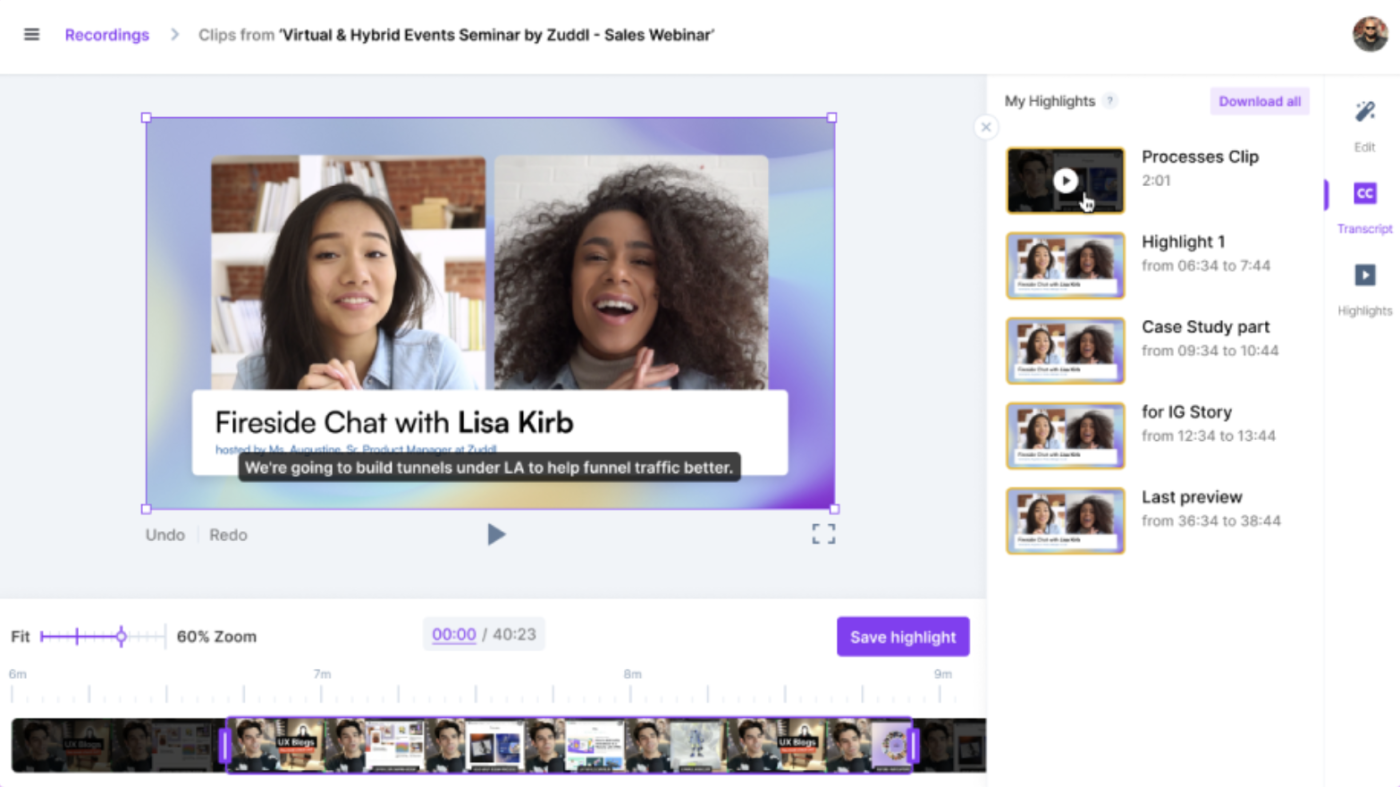
Zuddl pros:
Zuddl cons:
Zuddl is a more modular tool than most of the other apps on this list, in that it lets event managers build their own suite of features. You'll only pay for the parts of the software you need for your event, with the option to scale or switch based on event type or strategy.
The landing page builder lets you go as simple or complicated as you like. Choose a minimalist experience with SEO-friendly landing page templates, or opt for a custom-branded event website, using your business's domain if you want. On top of that, the flow builder tool makes it easy to create complex ticketing flows with conditional branching.
Event professionals seem to appreciate the immersive and energizing audience experience Zuddl offers. The mobile app includes chat, Q&A, and poll features to encourage engagement between attendees and session hosts. And live attendees can use the embeddable venue map, schedule builder, and 1:1 meeting scheduler to network and navigate their experience.
Zuddl integrates natively with many popular tools, such as Slack, HubSpot, and Stripe. And its Zapier integration lets you customize your event management even more by connecting Zuddl with your organization's entire tech stack. Here are a few examples.
Zuddl price: Custom
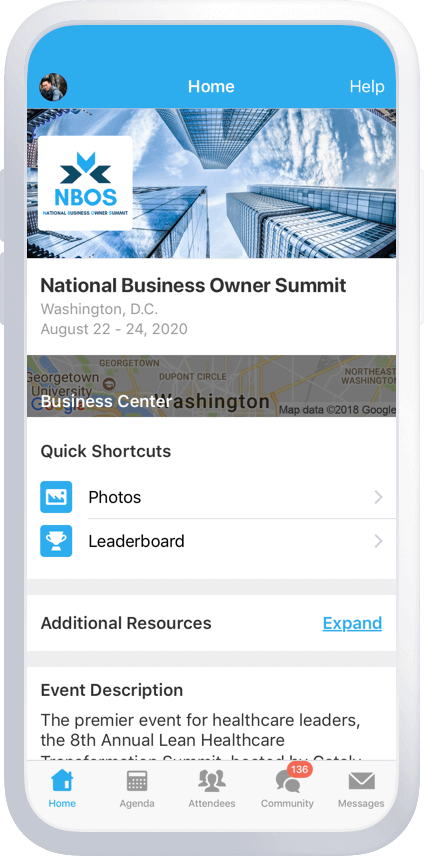
Whova pros:
Whova cons:
Whova gets a lot of love for its ability to boost attendee engagement and actually make networking easy and fun (imagine that). The mobile app includes live interaction features, like Q&A, polling, private chatting, and discussion threads. Features like meet-ups, group communications, and identifying common interests help attendees build strong connections during your event. And the social wall option is an easy way to highlight event activities, share announcements, and boost excitement.
David Weisselberger, founding partner of Erase the Case, uses Whova to organize criminal justice reform symposiums. He told me that he loves how personalized the app can be to really improve attendee experience and that it's easy to use—and scalable—on his end too.
Of course, Whova also offers plenty of back-end features, too. The no-code website builder is easy to use, with web traffic analytics that help you refine your marketing strategy. And the exhibitor management features include online booths, gamified booth interactions, and an exhibitor portal.
You can do even more with Whova when you connect it with Zapier—so you can do things like automatically add attendees to your event from your email marketing app. Here are some examples to get you started.
Whova price: Custom
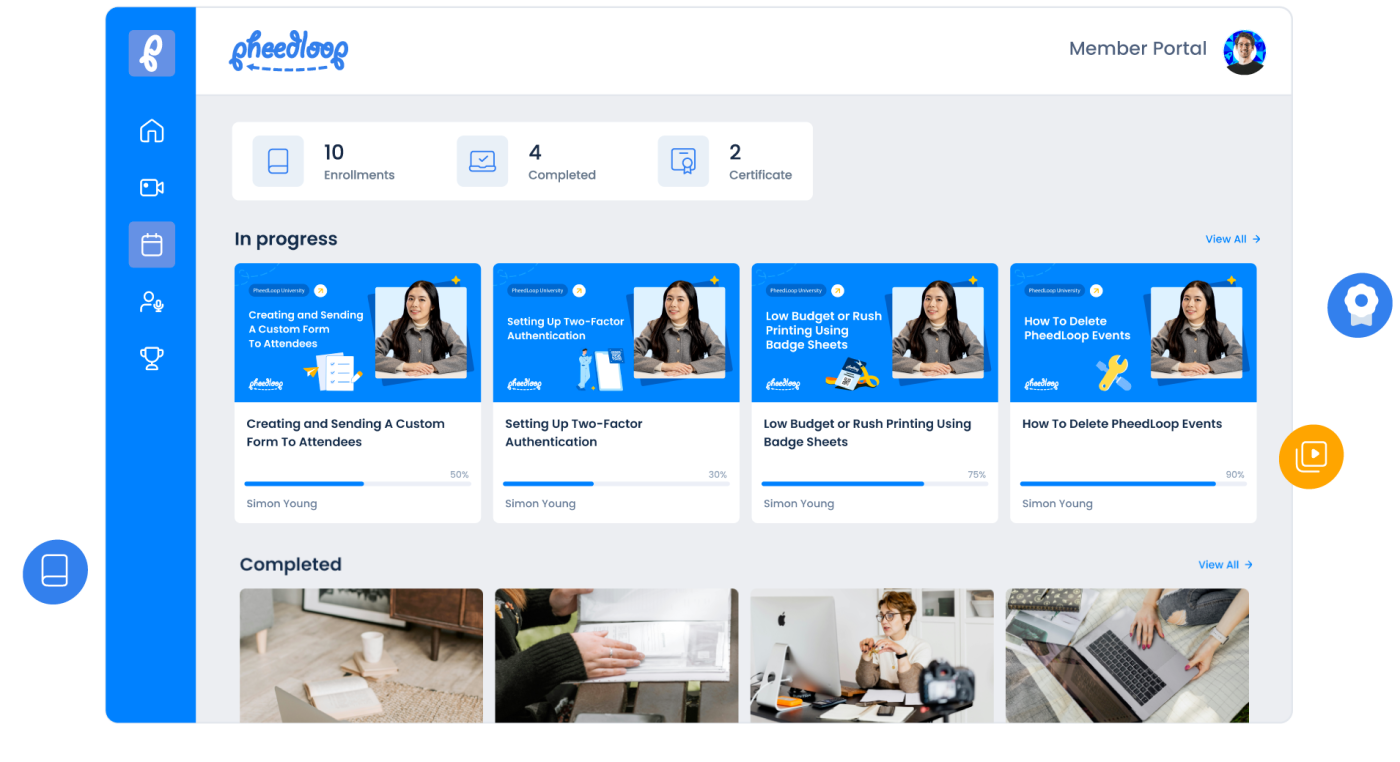
PheedLoop pros:
PheedLoop cons:
PheedLoop stood out to me because of its new Learning Management System (LMS) feature, which lets you offer courses and certifications for attendees. The online course system has a CE Credit Tracking feature where you can assign credits to sessions, award customized certificates, and track attendance. And all learner data is fully incorporated into your event management system, which can give you insights into your overall session performance.
Beyond the LMS, I found that most users appreciate PheedLoop's customizability and dynamic virtual options. They say the live chat, gamification, and customizable virtual environments help give online events an engaging flair. PheedLoop also has full-text support for more than 14 languages, which helps brands host online events for an international audience. And for live events, the seat and floor planning features help you simplify event layouts and book the right number of exhibitors.
PheedLoop also integrates with Zapier, which means you can automate repetitive tasks like adding attendees to your CMS or creating tasks in your project manager. Here are some pre-made workflows to show you how it works.
PheedLoop price: Custom
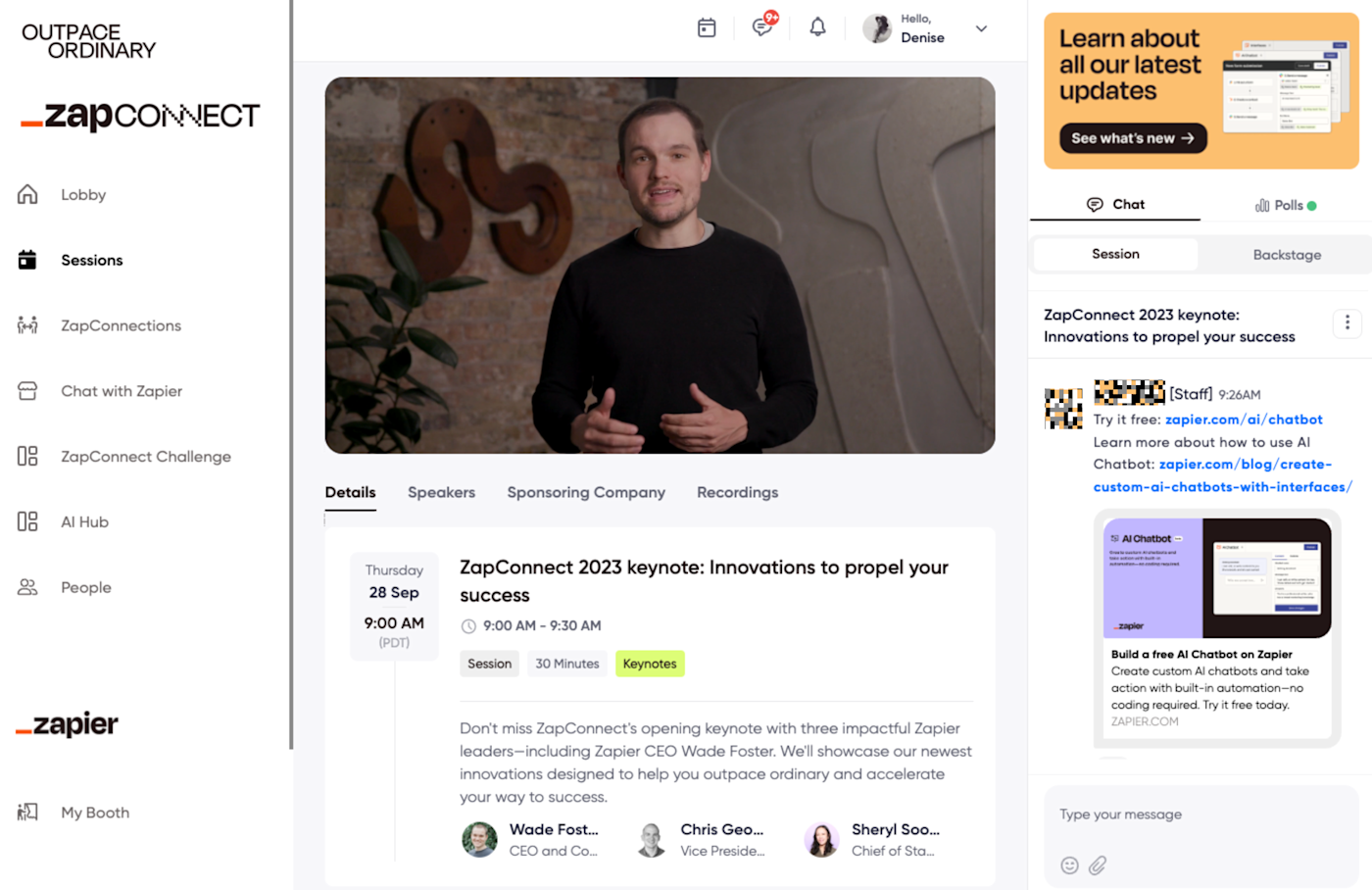
Accelevents pros:
Accelevents cons:
If your team's top priority is a highly responsive customer service team to support you in everything from setup to implementation, Accelevents is the way to go. When I reached out to Zapier's events marketing team for input on the best event management software, my colleague Denise sang Accelevents' praises: "Accelevents has the best-in-class customer support. Any time of night or day, they're back to us in minutes. It's a big reason folks choose them and stick with them, including our team."
Beyond the dedicated customer service, Accelevents offers plenty of customization and flexibility. Popular features include advanced registration workflows with conditional logic, automated check-in technology, and a website builder with dynamic widgets.
Accelevents also has plenty of native integrations with other event tools, CRMs, and payment processors. And the tool's Zapier integration lets you connect Accelevent with thousands of apps so you can streamline and simplify your event marketing tasks even more.
Accelevents price: Paid plans starting at $5,000 for one event.
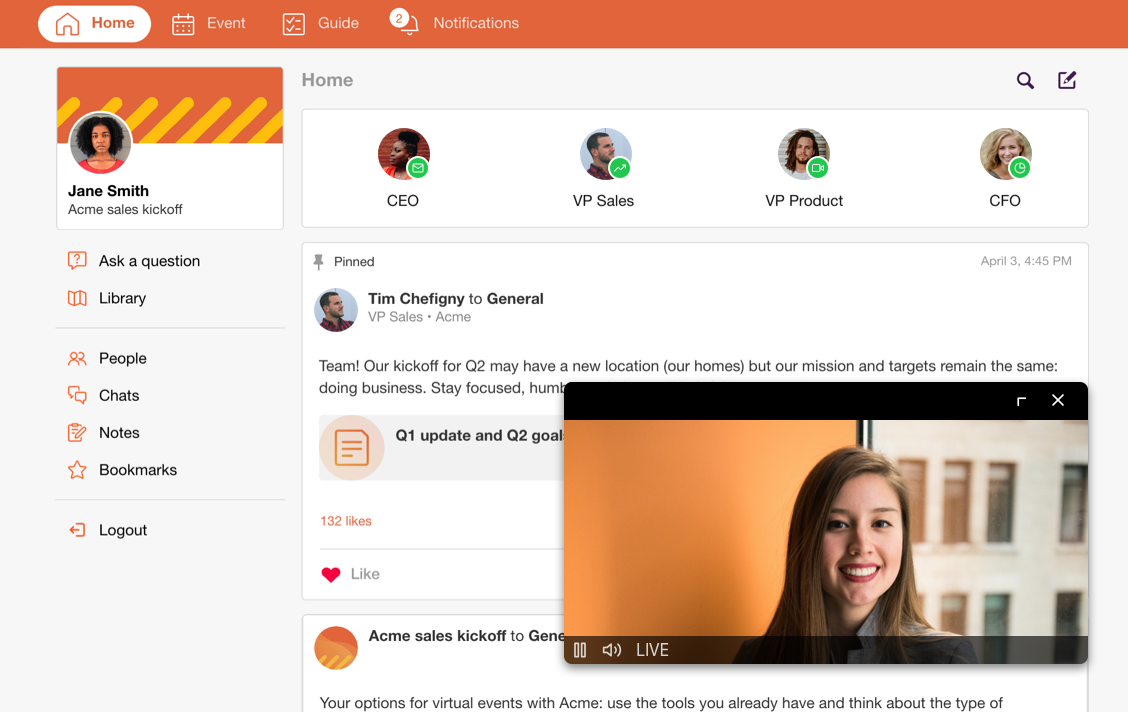
SpotMe pros:
SpotMe cons:
What sets SpotMe apart is its focus on security, compliance, and accelerating customer relationships at scale. Users have control over where their event and attendee data is hosted, and the platform runs weekly vulnerability assessments and annual pentest reports. The robust security and compliance features are crucial for industries like finance and medicine, where data security and regulatory compliance are non-negotiable.
In my research, I found that users appreciate SpotMe's high engagement capabilities, customization options, and flexibility. It offers branded and secure event apps that ensure a personalized experience for every attendee, along with deep data insights that seamlessly flow into your CRM system. Event marketers can create everything from simple webinars to complex, high-production events. Overall, SpotMe is known as a reliable, feature-rich solution that's designed for large-scale businesses.
SpotMe is user-friendly for attendees, too, with personalized agendas, interactive polling, livestreaming, and post-event recordings. And with SpotMe's Zapier integration, you can easily connect the event platform to the rest of your organization's most-used tools. Here are a few templates to show you how it works.
SpotMe price: Custom
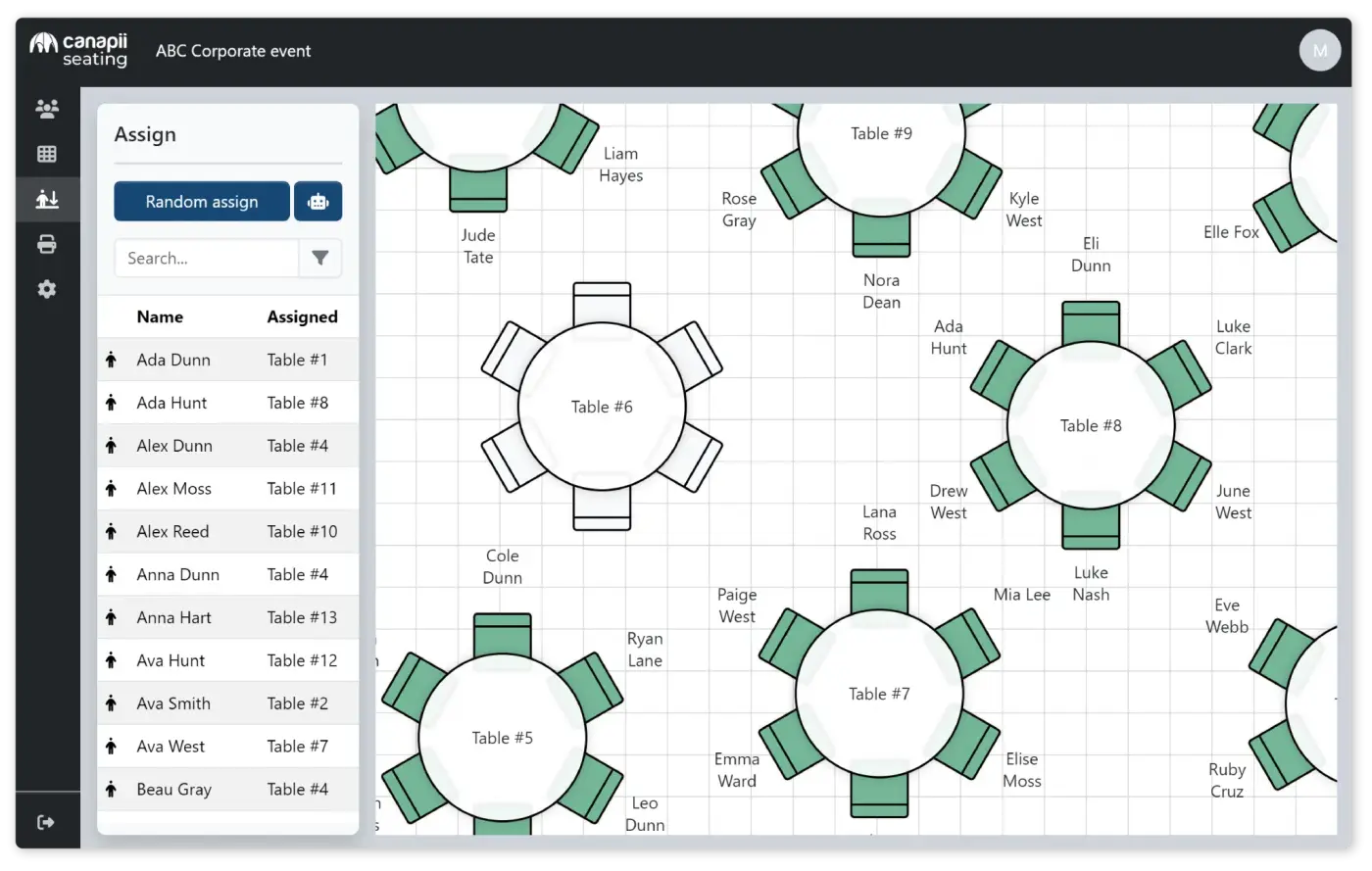
Canapii pros:
Canapii cons:
With Canapii, you can go beyond a simple guest list and instead track everything from RSVPs to meal preferences and seating charts. And you can easily visualize your event layout with specific attendee placements, whether you have banquet tables or expo booths. Event marketers, conference organizers, and trade show organizers say it's easy to get started planning a seamless and engaging event experience.
Canapii's Organizer Console helps event organizers keep their eyes on the prize by featuring key event goals and benchmarks in one dashboard. And it also offers all the important standard features, like customized event branding and registration forms, as well as engagement tools like live streaming, polling, Q&A, and gamification features.
Event planners appreciate that their sponsors can use Canapii's self-serve portal to create digital booths and upload downloadable content for the event. And the platform has a few native integrations with popular tools like Slack, Stripe, and Marketo—but keep in mind that the tool's integration options are more limited than other apps on this list.
Canapii price: Paid plans start at $2,950 for 300 attendees and 10 admins.
Event management is a broad category, so it makes sense that there are dozens (if not hundreds) of apps to choose from. I couldn't personally test each app (I sadly don't have the bandwidth to host multiple events across several dozen apps). So instead, my process involved doing in-depth research on each app and reaching out to professional event marketers—including Zapier's in-house marketing team—for their expertise.
A lot of very popular apps didn't make the cut for one reason or another (including not meeting my baseline G2 ratings cutoff, not fitting the category exactly, or some other reason). I did want to be sure to shout out a few big names, though, because a few folks mentioned them in my conversations:
Each of these platforms will help ease the event planning process and provide you with the tools you need to host and manage a successful event. The key is to choose an event management app that ties into your specific needs. For example, if you're hosting a local event and you're worried about a drop-off in ticket sales, pick software like Eventcombo that's heavy on marketing. But if you're putting together an all-singing, all-dancing conference and need to create floor plans with your team, Canapii's layout planning features can help. Whatever you choose, event planning software absolutely beats the DIY approach.
Related reading:
This article was originally published in July 2019 by Lizzie Davey. The most recent update was in July 2024.